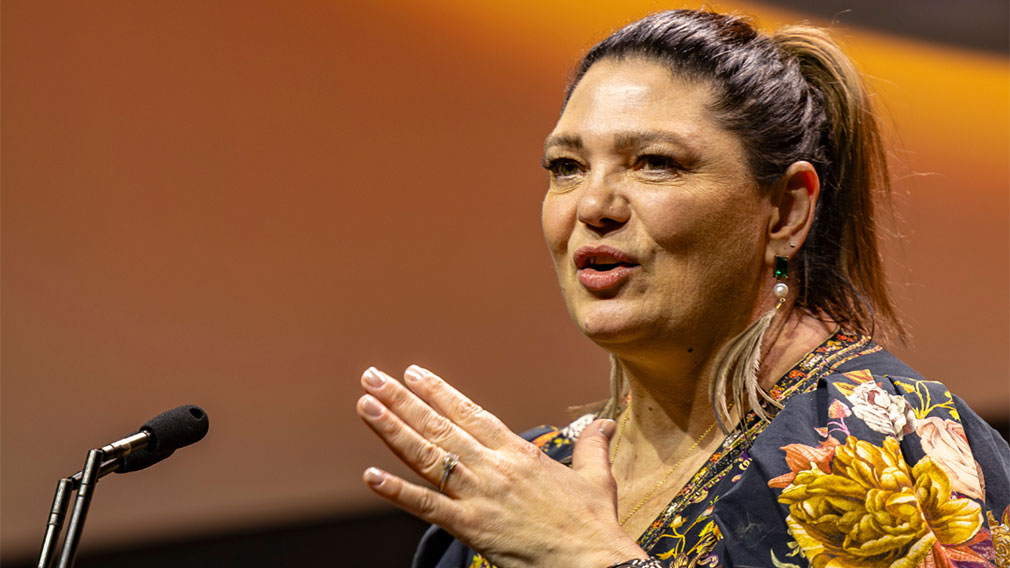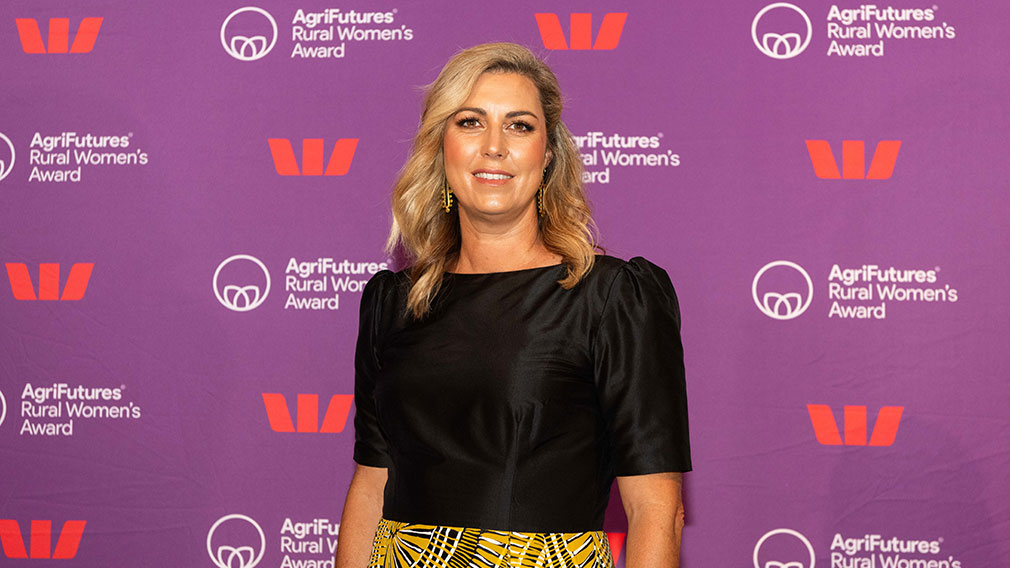Is Australia ready to listen?
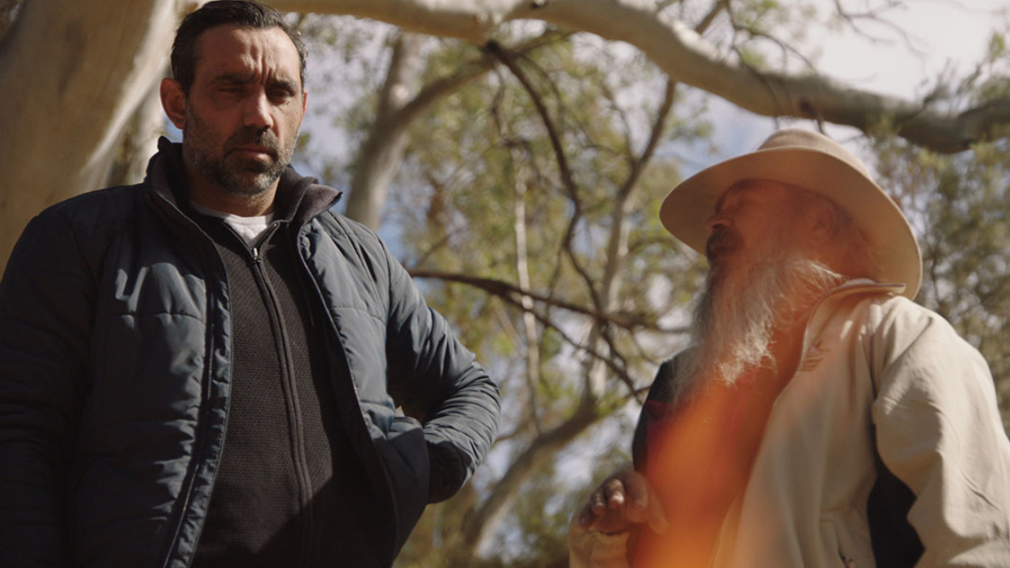
Australian of the Year and AFL legend Adam Goodes (left) with an Elder in a scene from The Australian Dream written by Stan Grant. (Supplied)
Yindyamarra Winanghanha. This is the essence of what it is to be a Wiradjuri person. It is a philosophy of generosity and respect. The English translation means ‘to live respectfully, in a world worth living in’.
Think about that. Not just to give and receive respect, but to create a world worthy of that respect. To be Wiradjuri is to belong to a place and a people. In my case, the Wiradjuri people of central western New South Wales. This is the country of my father, and his father and his before him. It is the country of his mother and her forebears. When I walk on Wiradjuri land, I am at home and at peace.
From my mother I am part of the Kamilaroi people. I have Dharrawal ancestry from the area around what is now Sydney. Together this heritage makes me an Indigenous person; the First Peoples of this continent. I am Irish too from a convict ancestor and the tangled branches of others bend and entwine themselves with my family tree. In this way I am Australian; all of the history of this land lives in me.
The Australian writer, Randolph Stow, at the opening of his novel Tourmaline once wrote, ‘I say we have a bitter heritage, but that is not to run it down’. A bitter heritage indeed. A heritage of terra nullius – empty land – that this was a continent free for the taking. A belief in the primacy of whiteness, ‘civilisation’ and progress that extinguished the rights of a peoples who had been here since the beginning of human time on this land.
Invasion, violence, disease, theft: the world of the First Peoples was upended so that a modern nation might be born. Must we run it down? What has been created here is a monument to sacrifice, ingenuity and sweat. Australia is that rare thing in our world, a liberal democracy: free, tolerant and prosperous. It is a country where we are freed from the shackles of history; where we can be judged not by who we are but who we may become.
Is this not our Australian Dream? It is an Australia born as a great 18th century Enlightenment experiment: founded on principles of liberalism: individual liberty, democracy, rule of law and freedom of expression. In his book of The Land of Dreams, historian former politician David Kemp writes:
“If any society was to be built on the recognition of the equality of each individual person, Australia’s historical circumstances and culture gave it the best opportunity to achieve such equality.”
But Kemp is not blind to its cost. British settlement, he says, was a “tsunami” that wreaked a “huge human cost in the abuse and violence against aboriginal (sic) peoples”.
Through my eyes, this Australia becomes a dream unfulfilled. It is a land where Indigenous people bear the weight of history. Where lives are short. The most incarcerated and impoverished people in the country.
This is the space between us. It is the bridge we have yet to cross. In Australia we bend towards each other, but still do not touch.
That’s what the film The Australian Dream is about, that space between us. Of course, it is a film about Adam Goodes, the Indigenous footballer booed out of the game. But Adam is all of us. When we – Indigenous people – heard that booing, we knew where it came from. It was the sound of Australia.
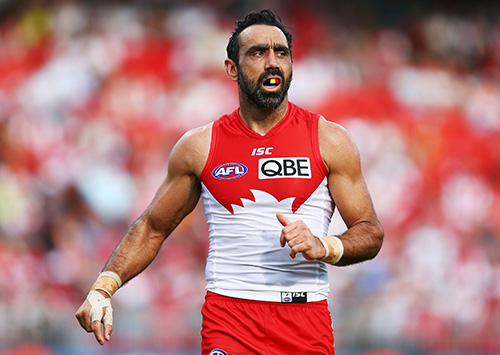
AFL legend Adam Goodes, the focus of The Australian Dream documentary, during a match in 2015. (Getty)
This was an Australia for other people. It has never truly been our Australia.
As a boy I looked on this Australia from the outside; from the fringes, from the margins. I had to pledge allegiance to this Australia, in school assembly rituals: “I honour my God, I serve my queen, I salute the flag”. Then I would return home to where this Australia had put us. I saw this Australia in the scars on my father’s body. But I saw another Australia – our Australia – in my father’s defiance and courage. In the dignity of my mother. In the laughter of my grandfather. It is the Australia of our survival.
If The Australian Dream offers any hope at all, it is in filling that space between us. In hearing our voices – black voices and inviting Australia to listen. Can we find ourselves in a truth much older than two centuries? Can those who have taken so much from this land, return to the First Peoples to truly find a way to live in it?
Yindyamarra Winanghanha. My father does not need the recognition of Australia. He can speak his language on his land and know who he is. This man who, as a boy, saw his grandfather jailed for speaking Wiradjuri has dedicated his life keeping his grandfather’s words alive. Wiradjuri is taught in schools and universities. A new generation of Australians black and white are learning to speak in the language of this country.
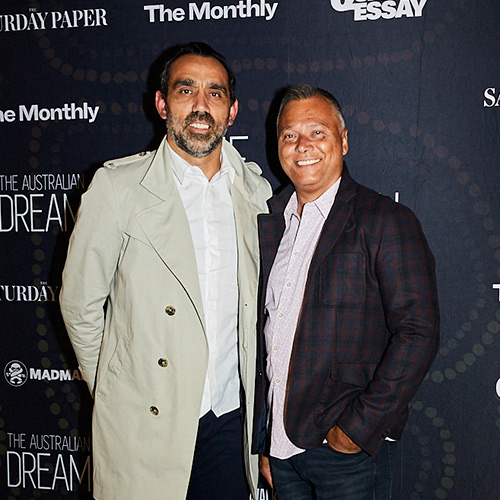
Adam Goodes (left) and Stan Grant at the premiere of The Australian Dream. (Supplied)
The Uluru Statement from the Heart offers a chance for Australians to walk with us. It speaks to the truth that the First Peoples must have a voice in Australia’s Constitution. It imagines a bigger country, that draws its sovereignty from entering into the sovereignty – the deep, unbreakable spiritual connection – of Indigenous Australia.
We each have our part to play. In our schools, our football fields, our beaches and barbecues: wherever we find ourselves we must ask what it is to belong. Corporate Australia has responsibilities beyond profit or work. There is a difference between wealth and well being. Between taking and giving. Between knowledge and wisdom.
Yindyamarra Winanghanha. To my people it is the wisdom of knowing who we are and where we are from. Indigenous people haven’t moved, we stand in our lore. There is a moment in The Australian Dream when an elder says to Adam Goodes, people will only hear when they are ready to listen. Is Australia ready to listen? Can we truly live respectfully in a world worth living in?
The Australian Dream documentary film was written by Stan Grant.

